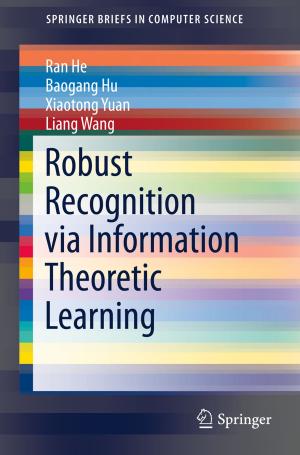Deep Reinforcement Learning for Wireless Networks
Nonfiction, Computers, Advanced Computing, Artificial Intelligence, Science & Nature, Technology, Engineering| Author: | F. Richard Yu, Ying He | ISBN: | 9783030105464 |
| Publisher: | Springer International Publishing | Publication: | January 17, 2019 |
| Imprint: | Springer | Language: | English |
| Author: | F. Richard Yu, Ying He |
| ISBN: | 9783030105464 |
| Publisher: | Springer International Publishing |
| Publication: | January 17, 2019 |
| Imprint: | Springer |
| Language: | English |
This Springerbrief presents a deep reinforcement learning approach to wireless systems to improve system performance. Particularly, deep reinforcement learning approach is used in cache-enabled opportunistic interference alignment wireless networks and mobile social networks. Simulation results with different network parameters are presented to show the effectiveness of the proposed scheme.
There is a phenomenal burst of research activities in artificial intelligence, deep reinforcement learning and wireless systems. Deep reinforcement learning has been successfully used to solve many practical problems. For example, Google DeepMind adopts this method on several artificial intelligent projects with big data (e.g., AlphaGo), and gets quite good results..
Graduate students in electrical and computer engineering, as well as computer science will find this brief useful as a study guide. Researchers, engineers, computer scientists, programmers, and policy makers will also find this brief to be a useful tool.
This Springerbrief presents a deep reinforcement learning approach to wireless systems to improve system performance. Particularly, deep reinforcement learning approach is used in cache-enabled opportunistic interference alignment wireless networks and mobile social networks. Simulation results with different network parameters are presented to show the effectiveness of the proposed scheme.
There is a phenomenal burst of research activities in artificial intelligence, deep reinforcement learning and wireless systems. Deep reinforcement learning has been successfully used to solve many practical problems. For example, Google DeepMind adopts this method on several artificial intelligent projects with big data (e.g., AlphaGo), and gets quite good results..
Graduate students in electrical and computer engineering, as well as computer science will find this brief useful as a study guide. Researchers, engineers, computer scientists, programmers, and policy makers will also find this brief to be a useful tool.















